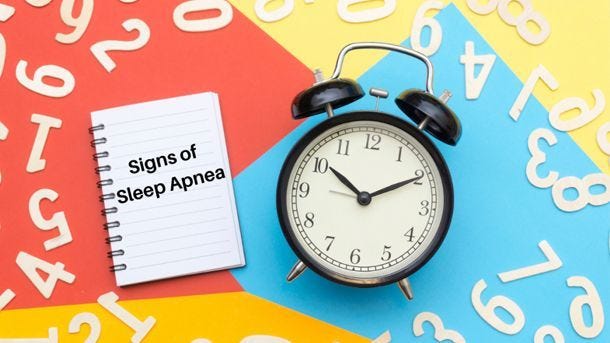Sleep Apnea Symptoms: Top Signs of Sleep Apnea
Sleep apnea is a disorder where a person periodically stops breathing during sleep due to the collapse of the airways in the throat. The condition is most often treated with CPAP therapy. However, most experts believe about 80% of people with sleep apnea remain undiagnosed. In this post we will discuss the top 10 signs of sleep apnea.
Top Signs of Sleep Apnea
To help provide knowledge, The CPAP Shop would like to present our top 10 signs of sleep apnea and symptoms. The hope is that it encourages people to consult a doctor if the Sleep Apnea symptoms sound familiar.
Difficulty with Concentration or Memory
One of the top 10 signs of sleep apnea is difficulty concentrating or difficulty remembering. Many patients have this symptom and can be misdiagnosed as something entirely different or much worse. Researchers have found that people with sleep apnea frequently fail in the process of turning short-term memories into long-term memories. Storing memories later access is a process that happens only during deep sleep. Sleep apnea often prevents people from staying in deep sleep long enough to categorize their experiences into memories. This then leads to difficulty with memory and causes forgetfulness. As far as affecting concentration, untreated sleep apnea has been found to decrease gray matter in the brain, which can cause decreased cognitive functioning. Additionally, certain areas of white brain matter were also found to be structurally changed, and this affects memory and mood.
Headaches Upon Waking
Another of the top 10 signs of sleep apnea is headaches upon waking. Approximately 50% of sleep apnea patients report this symptom. Sleep apnea decreases oxygen levels and increases carbon dioxide levels in the blood. Throbbing morning headaches from sleep apnea are due to the increase in blood carbon dioxide levels, which dilate blood vessels in and around the brain. For this reason, a sleep apnea headache occurs on both sides of the head and usually disappears after about 30 minutes when carbon dioxide levels return to normal.
Daytime Sleepiness
Another of the top 10 signs of sleep apnea is daytime sleepiness - especially driving. With the brain not getting enough oxygen, the body is jolts awake, preventing a good night of healing sleep. This causes significant daytime sleepiness resulting in an almost uncontrollable need to sleep during the day. People with daytime sleepiness always feel tired, fall asleep during monotonous jobs such as driving, and cause a brain fog that can negatively impact a person’s career, relationships and quality of life. Take note if someone you know feels tired all the time and falls asleep while eating or driving, and often naps during the day. It can be a symptom of sleep apnea.
Waking up Choking or Gasping
Waking up with a choking or gasping sensation is a common sign of sleep apnea. With sleep apnea, these breathing stoppages are real with the brain telling the body to wake itself up because it is in danger. CPAP therapy helps through the use of a CPAP machine and mask by pushing continuous air pressure through the mask and keeping the throat from closing. Be aware that even this relatively definitive symptom of sleep apnea can also be due to postnasal drip, asthma, heart attacks or pulmonary problems, and even stress.
Non-restorative Sleep
Non-restorative sleep is another of the top 10 signs of sleep apnea. With the constant waking during the night due to sleep apnea, the body does not get deep or REM sleep. Waking up in the morning feels like you have not even slept. This impacts many aspects of both health and quality of life
Loud Snoring
Loud or bothersome snoring is an indicator of sleep apnea but does not always result in a sleep apnea diagnosis. About 50% of people with sleep apnea snore more than the average person due to the narrowing of the throat muscles. The muscles of the throat relax, partially blocking the airway and they vibrate which causes the sound of snoring. Alcohol consumption, obesity and sleep position can all intensify snoring. Another factor that causes snoring and sleep apnea is a large tongue and tonsils, the shape of the chin and neck, and age. As people age, their muscles in the throat weaken and cause snoring and a greater likelihood of sleep apnea.
Other documented symptoms may be difficult to pinpoint without testing. The remaining 4 top signs of sleep apnea include:
- Sexual Dysfunction.
- Swelling in the lower extremities.
- Frequent trips to the bathroom to urinate at night.
- Chest pain and sweating during the night.
When you experience any “unusual” symptoms it is important to seek the advice of a qualified physician. Some of the symptoms of sleep apnea such as chest pain and acid indigestion can also point toward heart trouble. Conversely, trouble concentrating and memory problems are also symptoms of dementia, and seeing a doctor is the only way to truly pinpoint what may be wrong with you.
The good news is that sleep apnea is treatable without medication. CPAP therapy has been proven to be the most effective and least invasive treatment for sleep apnea available. With more public education about sleep apnea symptoms, we might start to lower the estimated 80% of people who remain undiagnosed. The CPAP Shop commits to doing its part in this education by continuing to post articles about sleep education. In particular, we want to help people identify signs of sleep apnea, best practices in sleep apnea treatment, and CPAP equipment reviews.
If we can answer any questions about CPAP treatment for sleep apnea or about any of our therapeutic products, please call us at (866) 414-9700, or you can contact us through our website.




